The Genius of Sleep
Once Upon A Time…
Once upon a time, many years ago, I shared a room with my two younger sisters. I have fond memories of our bed-time hours. We’d share stories, whisper secrets, and wish upon stars. Many a night, these sisterhood rituals helped us drift off to a state of rest and sleep where all our young girl troubles seemed to fade into the night sky. I miss those days, and I miss those nights.
Times have changed. The world today is filled with noise and distractions ever so present all around us. It is no wonder so many of us struggle to fall asleep and stay asleep. We struggle with all stages of rest and sleep, and in turn our awakened state is often less than ideal.
Why We Sleep
In his thoughtful and well-researched studies, Matthew Walker, a Neuroscientist and sleep expert, gives voice to the importance of sleep and rest. In his book, “Why We Sleep; Unlocking the Power of Sleep and Dreams,” he declares,
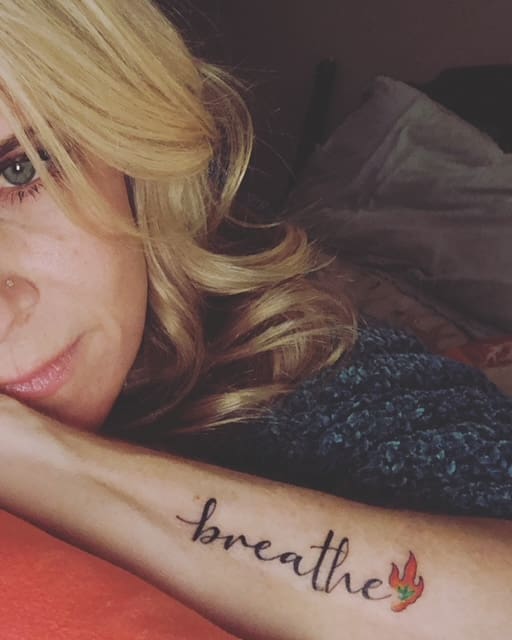
“Sleep is truly an object of AWE.”
As I’ve studied the effects of sleep on mental health and paid careful attention to my own habits and patterns, I have discovered the beauty of a good night’s rest.
Many factors contribute to our mental health, including biological genes, brain chemistry, life experience, trauma, family history, environment, lifestyle, diet, physical activity, substance use and so on. Parallels between lack of sleep and the high rates of depression, anxiety and other mental health issues are rapidly rising. Walker says, “The silent sleep epidemic is one of the greatest public health challenges we face today.” He asks us to be curious about the very systems at hand and suggests, “We will come to learn that sleep is the universal health care provider.” I wonder how our collective mental health could shift if we could look at sleep as a state of ‘AWE’…
Reception, Reflection, and Integration
Sleep was the first state of life on this planet. It was from sleep that wakefulness emerged. As we witness Nature, we are taught that life itself is an ebb and flow of seasonal activity and rest. We need periods of wakefulness and activity, just as we need periods of rest and sleep. As we understand the parallels of the various stages of wakefulness and sleep, we begin to see with new eyes. First, there is wakefulness. In this state we are constantly learning and receiving messages from the world around us. Waking brain activity resembles the outside sensory world, or reception. Next, is the state of rest and non-REM sleep which has its various stages. NREM plays a role in the body’s ability to repair, regenerate and rebuild. It is here that we store and strengthen raw ingredients of facts and skills. This state resembles the inside world, reflection. Lastly, there is deep sleep, known as REM sleep, also called “paradoxical sleep”. Here, it appears that the brain is awake but the body is clearly asleep. In this state, we discover innovative insights and problem solving abilities. This resembles integration. When periods of reception, reflection and integration are in balance, we create a state of harmony. We experience the fullness of our potential, and the result is a true mind-body-spirit connection.
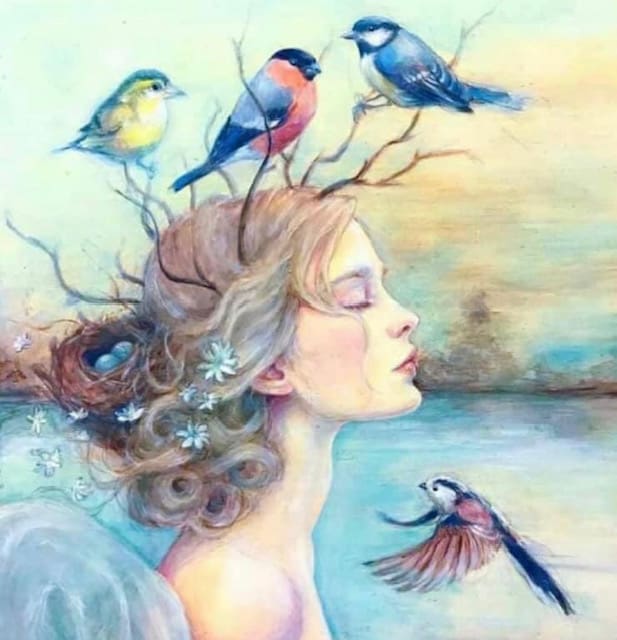

Night Owls and Morning Larks
It is interesting to view sleep through the lens of Parenthood. As a young mother, I recall many sleepless nights. I have vivid memories of rocking my babies to sleep, singing along to the words of a favorite lullaby, “Sleep, Baby Sleep.” Ironically, the very thing I wished for my daughters was the very thing I sacrificed- sleep. In those days, sleep did not feel like it was mine to have. In hindsight, I can see that since that season in my life, my personal sleep health has suffered.
In different seasons, our bodies and brains function differently. And, the circadian rhythms generated by our internal clocks vary from person to person. Let’s talk about the metaphor of morning larks and night owls.
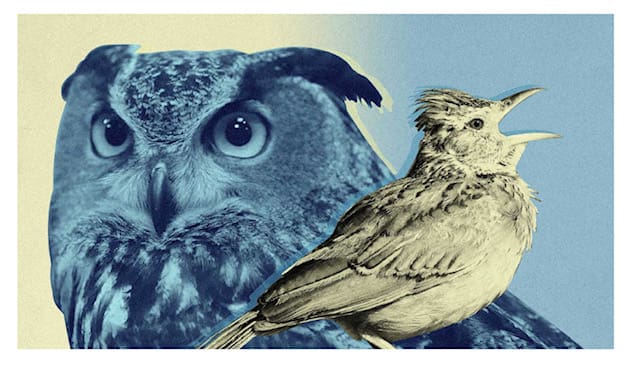

Morning larks are those who prefer to wake up around dawn and function optimally at this time of day, consisting of 40% of the population. Night owls are the ‘evening types,’ who prefer to go to bed later and subsequently wake up late, making up 30% of the population. The remaining 30% lie between AM and PM-ness with a slight leaning towards evenings.
In our culture, we optimize morning larks, thus the night owls are not often able to experience their full work potential in many jobs. Those who lean towards staying up late are chronically sleep deprived. Therefore, they have greater illness. They have higher rates of depression, anxiety, diabetes, cancer, heart attacks, strokes and a myriad of other physical and mental health challenges. It seems so unfair!
Miracles
A few weeks ago, I took a moonlight walk. In my neighborhood, there are so many beautiful trees. One can hear the music of the birds from dawn until dusk. As I walked in quiet meditation, engaged with my senses, I heard the call of an owl. The miraculous creature was right there, hidden in the branches of a tree right above me. I stood still and listened carefully, and I was left breathless in that moment. I was reminded of the uniqueness of the night owl.
Like birds, we humans are unique. At various seasons in my life, I have resonated with the life of a morning lark, while at other times I resonate with the night owls. For most of my adult life, I feel naturally drawn to the life of a morning lark. Currently, I am raising three teenage daughters, each in a different season of life. In our home, it often feels like we are a house full of birds, each of us singing a different tune, just trying not to nip and peck each other too much. Can you empathize?!
Prioritizing Sleep & Slowing Down
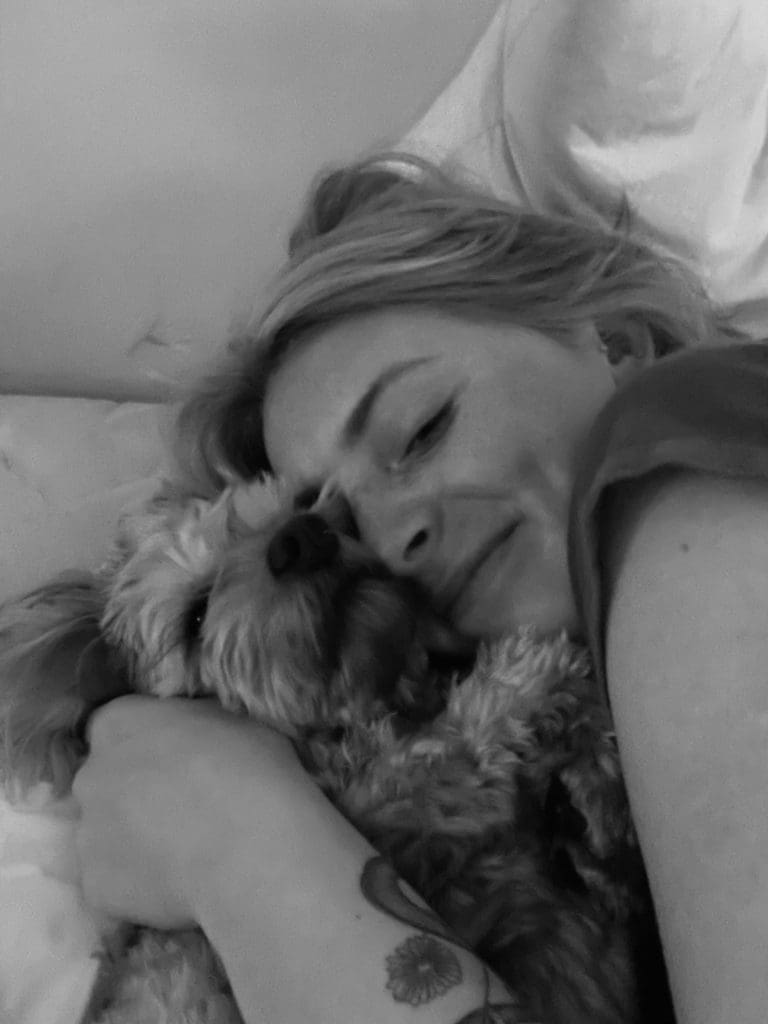

Recently, I have felt a call to better prioritize my sleep. The first step to change is awareness. So, I began to notice and observe. Over the last couple months, I kept a daily sleep journal. I also discovered the Sleep Cycle app which was helpful in observing my personal sleep patterns. Here are some of my observations. When I first began this self study, I observed that most nights, I was in bed between 7-8 hours; however, I was only actually asleep for 4-6 hours. Also, my quality of sleep seemed inconsistent. I noticed various brain wave fluctuations that did not make sense. Sometimes, I would wake up in the middle of the night unable to stop the churning of thoughts in the mind. I paid careful attention to my moods, my ability to focus, and my levels of anxiety in relation to the quality and quantity of my sleep. I noted inconsistencies in my schedule and fluctuations in the various stages of NREM and REM sleep. I observed lifestyle patterns that may contribute to my struggle with sleep. Noting my observations really woke me up (no pun intended)!
The Dalai Lama calls sleep “the best meditation”.
Ernest Hemingway says, “I love sleep. My life has a tendency to fall apart when I’m awake, you know?”
Matthew Walker says, “Sleep is the state we must enter in order to fix that which has been upset by being awake.”
The Power of Dreams
Albert Einstein was known for his genius ideas and innovative insights, which partially were inspired by the subconscious while in dream state. Some of his most inspired theories came to him in dream form. Einstein reportedly slept for 10+ hours per day, nearly one and a half times as much as the average American today. Akira Kurosawa, a Japanese painter and filmmaker, once said, “Man is a genius when he is dreaming.”
Yet, Einstein, just like us, lived in a confusing world. Like many other ‘geniuses’, he battled mental health challenges. While sleep is not a cure for our mental health struggles, it does contribute to improved well-being. There are many benefits to both the quantity and quality of our sleep. A few benefits of sleep and rest include improved heart function, mood, memory, and balance to the nervous system. Both quantity and quality of sleep contribute to our physical, psychological, emotional and spiritual health. Periods of rest, in an ever increasing world of pressure and demands, are vital for our brain health. Our daily habits and patterns play a key role in our sleep health. Our sleep health is tied directly to our mental well-being.
Sleep opens the door for us to dream. Dreaming enhances creativity and productivity.
Marsha Norman so poetically says,
“Dreams are illustrations from the book your soul is writing about you.”
My Bedroom, A Sanctuary
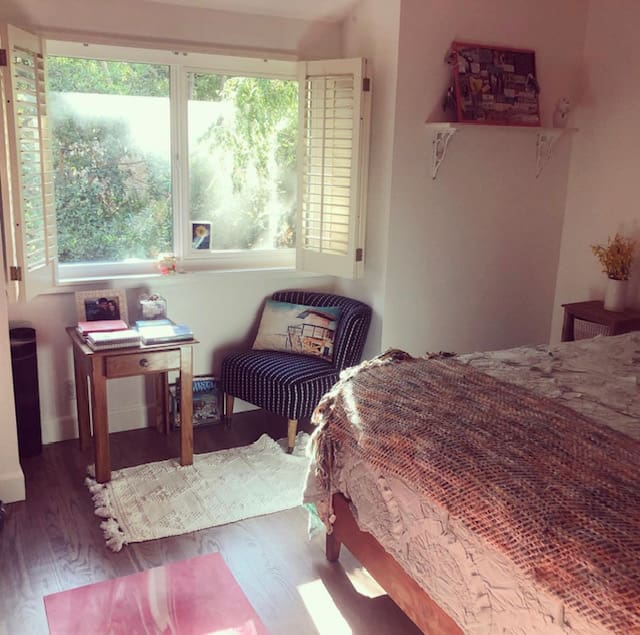

Our space matters.
In my efforts to improve my overall sleep health, I am exploring tools to help me. I want my bedroom space to support my sleep. I choose colors, pictures and symbols that bring me a sense of restfulness. And, I make changes to my space in different seasons. Often, I open my window for morning light. I spend time in meditation here. I am intentional with how I fuel my mind before bed. I choose books and stories that may inspire dreams of hope.
I am noticing a difference in our home as we have made small changes.
I am observing my own mental health improving, and I see my children making shifts. We are creating small changes which I hope will lead to long-term results.
The Gift of Sleep


Sleep is a wonderful form of self love and can enhance our awakened lives.
As we give our minds rest from the world around us, we awaken the dreams that live within.
May you gift yourself with good quality rest & sleep, my friends!
Love, Holly
References
- “Why We Sleep; Unlocking the Power of Sleep and Dreams”, by Matthew Walker
- Yoga Therapy for Sleep & Brain Health, HAPY, Stephani Sutherland
- “The Healing Path of Yoga,” by Nischala Joy Devi
- “The Strange Sleeping Habits of Five Great Geniuses”, The Sleep Judge
- My personal 8 week experiment & observations (Daily journaling, Sleep Cycle app, Yoga Therapy tools, etc.)


I love this Holly! This information was so well thought out. I appreciate the way it provided hope for me to change even just one thing so I can hopefully improve my sleep. The pictures made me smile and the music relaxed my soul! Thank you for taking the time to educate us, and to care enough about us to do the work to help us!! Love you 💕
Becca, thank you! I’ve loved our conversations lately as they’ve inspired my writing. Thank you so much for being in my life, I love you!